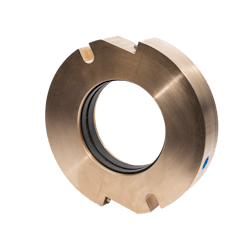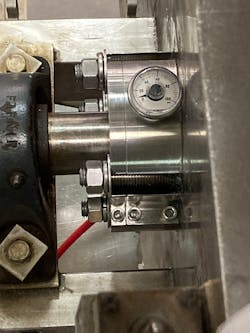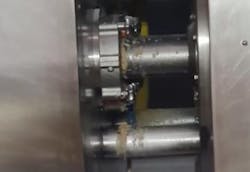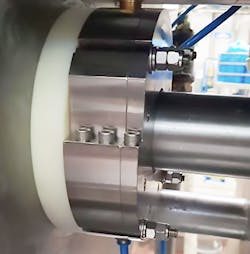FDA-compliant seal technology is often required in the food industry. This means that the materials of construction must meet FDA requirements for sanitation and food safety. If using compression packing to seal rotating equipment such as pumps, mixers and blenders, a food-grade packing must be used. Mechanical seals and other metal or plastic sealing technology must be produced from a food-grade sanitary material, such as stainless steel or metal-detectable plastic.
Often, these technologies are installed in equipment that is cleaned or steamed in place. These conditions must be taken into account when selecting a sealing solution. The seal technology must be able to withstand the cleaning chemicals and maximum temperatures of the cleaning/steaming processes.
If the incorrect technology is selected for dry powder or slurry applications, other pricey problems may occur, including:
- Equipment failure
- Downtime and lost production
- Replacement equipment or parts costs (this may require a crane or other service to remove the equipment or access the location to replace the parts)
- Product waste
- Other equipment contamination
- Housekeeping issues
- Personnel safety
- Labor costs (operations, maintenance and housekeeping)
Sealing solution for powders and slurries
Particulates in powders and slurries wreak havoc on traditional sealing technologies, such as compression packing and mechanical seals. These sealing solutions are often ideal for many applications. However, if the process includes solid particles, they accelerate shaft and seal technology wear. Leakage, waste, equipment damage and downtime are inevitable.
When rotating assets move and mix slurries and powders, an air seal often becomes the ideal solution (Figure 2). This technology uses a knife of air to seal the process, eliminating particle ingress into the seal. The floating throttle of these maintenance-free air seals do not contact the shaft, so they cause no shaft or sleeve wear. They also withstand ±0.125 inch of parallel movement, meaning they can handle the deflection that often occurs in mixers, blenders and agitators. (Note: You can find a video about air seals in the videos section of Processing's website.)
Because of their successful operation and flexibility, air seals are becoming a popular sealing solution for any application that contain particulates and/or experience axial or radial movement.
Case study: Ribbon blender in Northeast
A Northeast producer of seasonings, sauces and food coatings experienced repeat problems with a ribbon blender. This blender combined a seasoning mix. The blender failed frequently and experienced leakage, shaft wear, and safety and sanitation concerns as well as housekeeping issues. The two seals on either end of the single-shaft bender were the root cause of these problems.
One seal was a plastic seal that appeared damaged. The other was a contacting air seal. Because of contact with the shaft, the seal wore the shaft. This increased the clearances, eliminating the ability for the air to seal the mixture. Leakage from both shaft seals was heavy.
Two noncontacting air seals replaced the two failing seals. Since their installation more than five months ago, the blender has operated perfectly. The producer plans to install these seals on other mixers and blenders within the facility.
Case study: Mixers in Mexico
Producing sweet treats requires mixing, blending and baking with many powder ingredients. A large bakery and candy maker in Mexico dealt with repeat seal failures on two chocolate mixers. One had a contacting air seal installed, and the other had an originally installed lip seal. An additional issue for this producer was ensuring that any potential breakaway, foreign material that may accidentally enter the process be detectable and easy to remove. If not, a failed or broken piece of equipment could mean a lost batch of product and thousands of pesos, as well as lost production because of downtime, part replacement and batch cleanup.
First, to eliminate the seal failures, two noncontacting air seals replaced the contacting air seal and original lip seal (Figure 4 shows before and after operation).
The baker asked the air seal manufacturer to adapt the throttles that accelerate the air out of the seal, forming the air knife (Figure 5). As a precaution, the Mexican company wanted the thermoplastic throttle to be metal-detectable in case it ever broke or chipped and entered the process (a nearly impossible event). The manufacturer used a stainless-filled PTFE throttle instead of the traditional throttle in an air seal. The bakery has been satisfied with the air seal’s operation to date.
The future for the food industry
Regulations on the food industry are fluid, especially with new and changing guidance around COVID-19. Plants must focus on reliability to maximize uptime and prevent product waste. Air seal technology — a maintenance-free, long-life solution — continues to succeed in many food applications.
Zach Nepa is a regional manager for SEPCO. He has more than five years in the sealing industry and graduated with a B.A. from State University of New York at Binghamton. He may be reached at [email protected].
Chris Tindell, CMRP, is a regional business manager for Sealing Equipment Products Co., Inc. (SEPCO). A reliability leader in the fluid sealing industry, SEPCO supports global distribution in more than 30 countries. Tindell is a maintenance and reliability professional with more than 20 years of experience in reliability consulting, training and troubleshooting equipment. He is an experienced vibration and lubrication analyst and maintains professional certifications in multiple engineering technology fields. Tindell has worked in many manufacturing industries, auditing and optimizing PSM maintenance programs and providing training on RCM and Lean manufacturing strategies. Tindell may be reached at [email protected].
Sealing Equipment Products Company (SEPCO)





